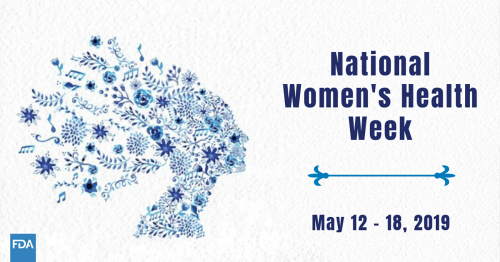May 2019 Office of Women's Health e-Update
Message from the Acting Associate Commissioner
FDA Announces New Information about Breast Implants
Dear Stakeholders,
Last week we shared breaking news from the FDA on the agency’s efforts to improve communication and evidence generation to help ensure the safety of breast implants. As I stated in my opening remarks at the March 2019 FDA Public Advisory Panel Meeting on the long-term benefits and risks of breast implants, OWH is dedicated to supporting the availability of safe and effective products for women. We achieve our mission through our internal and external collaborations, as is evident in this effort. Last month, we also shared an update on FDA actions ordering manufacturers to stop selling surgical mesh products intended for transvaginal repair of pelvic organ prolapse. I encourage you to read the full FDA statements on both topics below. OWH will continue to work across the agency to support the health of women and disseminate timely FDA information on critical women’s health topics.
Next week we celebrate National Women’s Health Week from May 12 -18. I invite you to join us on May 15, 2019 (11:00 AM - 12:00 PM ET), for a lecture by Dr. Saralyn Mark on how sex-based differences have a significant impact on our mission of space exploration. Please Register for “Sex Is Not Lost in Space.”
Kaveeta Vasisht, M.D., Pharm.D.
Acting Associate Commissioner for Women's Health
----------------------
Statement from FDA Principal Deputy Commissioner Amy Abernethy, M.D., Ph.D., and Jeff Shuren, M.D., J.D., director of the FDA’s Center for Devices and Radiological Health on FDA’s new efforts to protect women’s health and help to ensure the safety of breast implants
There has been a growing discussion in recent months around the safety of certain breast implants, with regulatory agencies around the world weighing the risk of breast implant-associated anaplastic large cell lymphoma (BIA-ALCL). It’s an issue that has been a priority for us at the U.S. Food and Drug Administration since 2011 when we warned women that the available information at the time indicated that there is a risk for women with breast implants, especially those with textured implants, for developing this disease.
FDA takes action to protect women’s health, orders manufacturers of surgical mesh intended for transvaginal repair of pelvic organ prolapse to stop selling all devices
The U.S. Food and Drug Administration ordered the manufacturers of all remaining surgical mesh products indicated for the transvaginal repair of pelvic organ prolapse (POP) to stop selling and distributing their products in the U.S. immediately. The order is the latest in a series of escalating safety actions related to protecting the health of the thousands of women each year who undergo surgery transvaginally to repair POP.
The FDA has determined that the manufacturers, Boston Scientific and Coloplast, have not demonstrated a reasonable assurance of safety and effectiveness for these devices, which is the premarket review standard that now applies to them since the agency reclassified them in class III (high risk) in 2016. As part of the 2016 reclassification, manufacturers were required to submit and obtain approval of premarket approval (PMA) applications, the agency's most stringent device review pathway, in order to continue marketing their devices in the U.S. The companies will have 10 days to submit their plan to withdraw these products from the market.
Women's Health Highlights
OWH New Journal Article | Evaluation of worldwide clinical trials by gender: An FDA perspective
We would like to share OWH’s latest publication assessing women's participation in clinical trials from a global perspective. Clinical trials are becoming increasingly multi-national, and the increasing representation of women across countries is promising. However, additional progress is needed to ensure increasing diversity.
Shedding New Light on Sunscreen Absorption
Skin cancer incidence rates continue to rise, making risk from excess sun exposure an important public health priority. Yet despite what we know about prevention, skin cancer remains the most commonly diagnosed cancer in the United States. Used with other sun protective measures, broad spectrum sunscreens with SPF values of at least 15 are critical elements for preventing skin cancer and protecting the skin from sunburn and other UV damage. With sunscreens now being used with greater frequency, in larger amounts, and by broader populations, it is more important than ever to ensure that sunscreens are safe and effective for daily, life-long use.
FDA approves ado-trastuzumab emtansine for early breast cancer
On May 3, 2019, the Food and Drug Administration approved ado-trastuzumab emtansine (KADCYLA, Genentech, Inc.) for the adjuvant treatment of patients with HER2-positive early breast cancer (EBC) who have residual invasive disease after neoadjuvant taxane and trastuzumab-based treatment. Patients should be selected based on an FDA-approved companion diagnostic for ado-trastuzumab emtansine. FDA also approved both the Ventana Medical Systems, Inc. PATHWAY anti-HER-2/neu (4B5) Rabbit Monoclonal Primary Antibody assay and the INFORM HER2 Dual ISH DNA Probe Cocktail assay as companion diagnostic devices for selecting patients.
Statement from Principal Deputy Commissioner Amy Abernethy, M.D., Ph.D., and Janet Woodcock, M.D., director of FDA’s Center for Drug Evaluation and Research, on policies designed to capture more data to better understand effects of prescription drugs in pregnant and nursing women
It can be a challenge for health care professionals and patients to find quality scientific information about the safety of drugs and biological products when used during pregnancy or breastfeeding. Ethical challenges often arise in studying women in these populations as there are valid concerns about maternal and fetal safety. For example, if a woman who is currently breastfeeding starts an investigational drug for a disease or condition, breastfeeding should be discontinued for the duration of the study because the risks of the exposure to the drug in the breastfeeding infant may outweigh the benefits.
The FDA is committed to advancing and promoting women’s health and continues to engage in an open public dialogue with patient groups, medical experts and other federal partners to address the gap in scientific knowledge for women during this important phase of their lives. Today, we’re issuing two draft guidances, which, when finalized, will provide new and updated information for companies designed to increase the availability of high-quality safety information in drugs used during pregnancy or lactation.
FDA requires stronger warnings about rare but serious incidents related to certain prescription insomnia medicines
The U.S. Food and Drug Administration announced the agency is requiring a new boxed warning – the agency’s most prominent warning – on certain prescription insomnia drugs to better ensure patients and their health care professionals have the information they need when considering use of these medicines. The new warnings will be required for eszopiclone (Lunesta), zaleplon (Sonata) and zolpidem (Ambien, Ambien CR, Edluar, Intermezzo, and Zolpimist).
- Read the full FDA News Release.
- Read the FDA Consumer Update, “Taking Z-drugs for Insomnia? Know the Risks.”
FDA launches public education campaign to encourage safe removal of unused opioid pain medicines from homes
The U.S. Food and Drug Administration announced the launch of a new education campaign to help Americans understand the important role they play in removing and properly disposing of unused prescription opioids from their homes. The “Remove the Risk” campaign is targeting women ages 35-64, who are most likely to oversee household health care decisions and often serve as the gatekeepers to opioids and other prescription medications in the home.
- Read the full FDA News Release.
- Visit the Safe Opioid Disposal - Remove the Risk Outreach Toolkit webpage.
- Visit FDA OWH’s Women and Pain Medicines webpage.
Call To Action
National Women’s Health Week Partner Resources
May 12, 2019 – May 18, 2019 is National Women’s Health Week. Empower the women in your community to make healthy decisions for themselves and their families.
- Download the National Women’s Health Week Partner Social Media Toolkit
- Link to the FDA For Women and Women’s Health Research webpages.
- Share messages from FDA OWH on Twitter, Pinterest, and other platforms.
Visit FDA’s New Website
FDA is pleased to announce the launch of our newly redesigned public website. We made improvements to provide a more modern and customer-centric web experience. The focus of the new FDA.gov design is on content and helping users to complete tasks easily and quickly. These website improvements will modernize FDA.gov and advance the Agency’s mission to protect and promote the public health. Let FDA know what you think – lessons learned from our visitors’ experiences will be used to make future improvements.
- Check it out at www.fda.gov.
- For more information, please visit the FDA.gov Website Refresh page
Meetings
Participate in Upcoming FDA Meetings
The Future of Insulin Biosimilars: Increasing Access and Facilitating the Efficient Development of Biosimilar and Interchangeable Insulin Products
May 13, 2019; Silver Spring, MD
Responsible Innovation in Dietary Supplements
May 16, 2019; College Park, MD
General and Plastic Surgery Devices Panel of the Medical Devices Advisory Committee Meeting Announcement
May 30 – 31, 2019; Gaithersburg, MD
Scientific Data and Information about Products Containing Cannabis or Cannabis-Derived Compounds; Public Hearing
May 31, 2019; Silver Spring, MD
Preparation for International Cooperation on Cosmetics Regulation Thirteenth Annual Meeting; Public Meeting
June 5, 2019; College Park, MD


